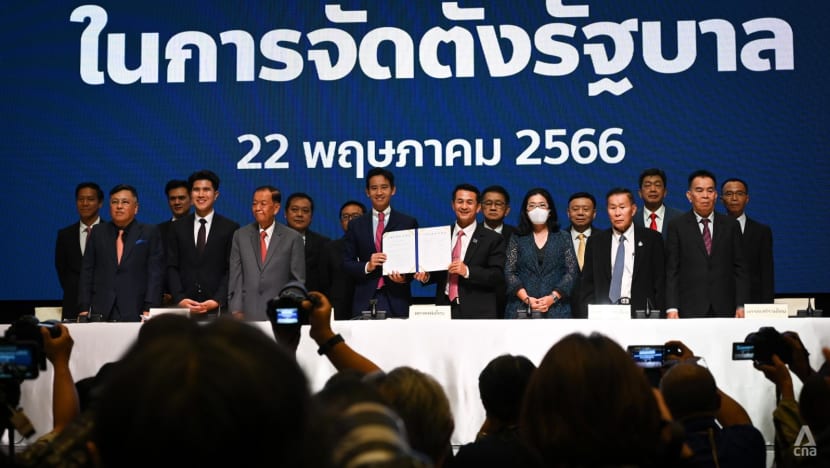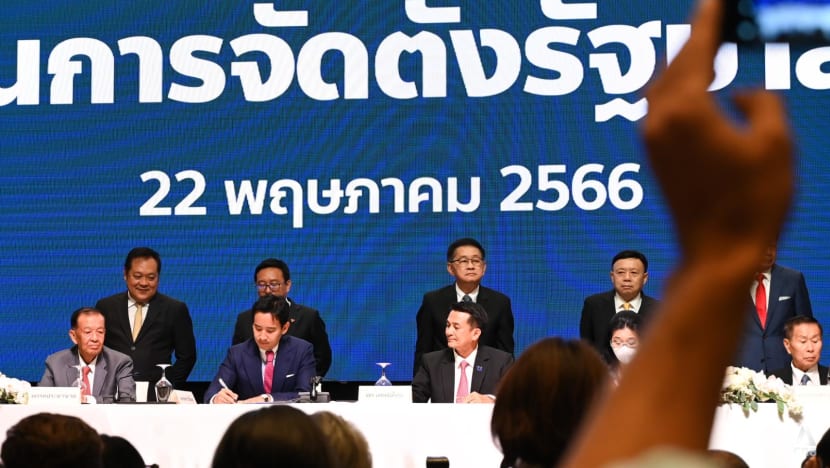Thailand’s Move Forward party coalition signs MOU after electoral victory

The Move Forward party and its seven political allies signed a memorandum of understanding on May 22, 2023. (Photo: CNA/Pichayada Promchertchoo)
BANGKOK: Thailand's Move Forward party and its seven political allies signed a memorandum of understanding (MOU) on Monday (May 22) to affirm a mutual agreement to drive 23 agendas once their coalition government is formed.
The MOU - coming on the heels of Move Forward's unexpected win in the May 14 general election - aims to create a basis for the forming of Thailand’s next government, and to determine the common direction of work among the eight member parties.
“It is a compilation of agendas we mutually agreed upon and are ready to bring forth through the governmental and parliamentary mechanisms,” said Move Forward's leader and prime ministerial candidate Pita Limjaroenrat.
“It also shows the responsibilities shared by the parties that will form a government together.”
Among the key missions are drafting a new constitution, legalising same-sex marriage, placing cannabis back on the banned narcotics list and replacing compulsory enlistment with voluntary recruitment during peacetime.
“All the parties agreed that every mission the government will bring forth must not affect the status of the state under the constitutional monarchy or the inviolable status of the monarch,” said Mr Pita.
The coalition currently comprises Move Forward, Pheu Thai, Prachachat, Thai Liberal Party, Thai Sang Thai, Fair, Plung Sungkom Mai and Pue Thai Rumphlang.
Together, they have 313 seats in the 500-member House of Representatives.
The signing of the MOU on Monday was a symbolic gesture reminiscent of when a coup d’etat led by incumbent Prime Minister Prayut Chan-o-cha disrupted Thailand’s politics nine years ago.
On May 22, 2014, the then-army chief seized power from Ms Yingluck Shinawatra’s democratically elected government. His junta ruled Thailand for nearly five years before a general election was held in 2019 under a new constitution written by a military-appointed committee.
At the time, the Pheu Thai Party won a majority of seats in the House of Representatives but the pro-junta Palang Pracharat Party managed to form the government with its political allies, resulting in General Prayut’s premiership.
He joined this year's electoral race hoping to stay in power after more than eight years on the job. However, his new party United Thai Nation lost and came fifth.
“Today is a historic day and a good milestone that reflects the success of Thai society in peacefully transitioning back to a democratic system through the parliamentary system,” Mr Pita said on Monday.

ROYAL DEFAMATION LAW NOT INCLUDED
Besides the 23 agendas, the eight parties also agreed to jointly govern the country while protecting citizens’ rights and civil liberties as well as prioritising public interests over that of any member party.
“All the parties have the right to advocate additional policies as long as they do not contradict the policies outlined in this memorandum of understanding,” said Move Forward's leader.
This could be done through the executive power wielded by ministers who represent their respective parties, or the legislative power of representatives from any of the eight parties.
Although the MOU does not mention Move Forward’s policy to amend Thailand's royal defamation law, Mr Pita maintained his party would continue pushing for a legal change in parliament.
“I don't think, when the time comes, the Move Forward party will be alone,” he said.
Also known as the lese-majeste law, Section 112 of the Thai Criminal Code stipulates that whoever defames, insults or threatens the king, queen, heir-apparent or regent shall be punished with imprisonment of three to 15 years.
Its direct involvement with the monarchy and harsh prison sentence, which is equivalent to that of involuntary manslaughter, has made it a taboo topic in Thai society.

















